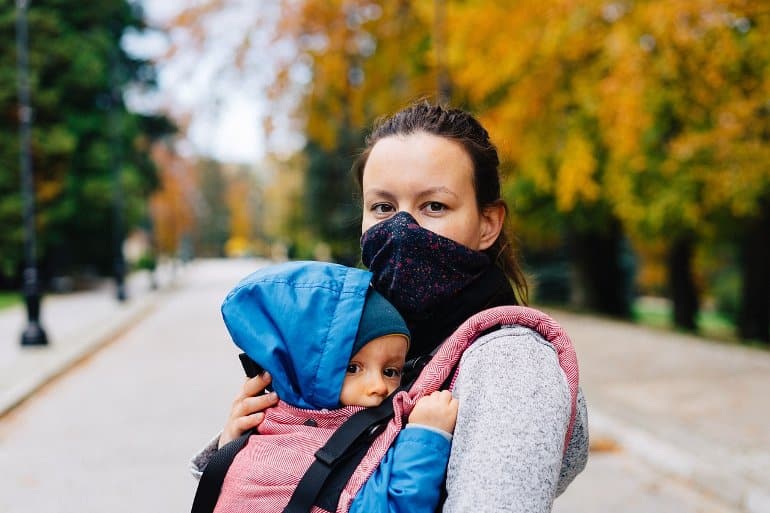Summary: Regular exercise, good quality sleep, and maintaining a healthy diet may be key to preventing long-term complications following COVID-19 infection. Researchers found women who followed a healthy lifestyle had half of the risk of developing long-COVID compared to those with unhealthy lifestyles.
Source: Harvard
Women who followed most aspects of a healthy lifestyle, including healthy body weight, not smoking, regular exercise, adequate sleep, high quality diet, and moderate alcohol consumption, had about half the risk of long COVID compared with women without any healthy lifestyle factors, according to a study led by Harvard T.H. Chan School of Public Health.
“With ongoing waves of COVID-19, long COVID has created a serious public health burden. Our findings raise the possibility that adopting more healthy behaviors may reduce the risk of developing long COVID,” said Andrea Roberts, senior research scientist in the Department of Environmental Health and senior author of the study.
The study appears online February 6, 2023, in JAMA Internal Medicine.
It’s estimated that 8-23 million Americans suffer from long COVID, which is defined as having COVID-19 symptoms four weeks or more after initial SARS-CoV-2 infection. Symptoms can include fatigue, fever, and a variety of respiratory, heart, neurological, and digestive symptoms.
The researchers analyzed data from more than 32,000 female nurses in the Nurses’ Health Study II, who reported on lifestyle in 2015 and 2017 and reported history of SARS-CoV-2 infection from April 2020 to November 2021.
During that time, more than 1,900 participants contracted COVID-19. Among these, 44% developed long COVID. Compared to women without any healthy lifestyle factors, those with five or six had 49% lower risk of long COVID.
Among the six lifestyle factors, maintaining a healthy body weight and getting adequate sleep (seven to nine hours daily) were the ones most strongly associated with lower risk of long COVID.

The results also showed that, even among women who developed long COVID, those with a healthier pre-infection lifestyle had 30% lower risk of having symptoms that interfered with their daily life.
The authors noted that one possible explanation for the associations they observed is that, based on prior research, an unhealthy lifestyle is associated with increased risk of chronic inflammation and immune dysregulation, which have been linked with increased risk of long COVID.
“In the past decades, scientists have accumulated evidence that healthy lifestyle is good for overall health. However, in the U.S. for example, 70% of the population do not have a healthy body weight and 30% do not sleep enough.
“Findings from this study suggest that simple lifestyle changes, such as having adequate sleep, may be beneficial for the prevention of long COVID,” said lead author Siwen Wang, research fellow in the Department of Nutrition.
Other Harvard Chan School authors included Yanping Li, Yiyang Yue, Changzhen Yuan, Jorge Chavarro, and Shilpa Bhupathiraju.
Funding: Support for the study came from NIH NICHD grant 3R01HD094725-02S1. Other support includes grants U01HL145386, R24ES028521, U01 CA176726, R01 CA67262, and R01 HD057368 from the NIH, the Dean’s Fund for Scientific Advancement Acceleration Award from Harvard Chan School, and Massachusetts Consortium on Pathogen Readiness Evergrande COVID-19 Response Fund Award.
About this long-COVID research news
Author: Maya Brownstein
Source: Harvard
Contact: Maya Brownstein – Harvard
Image: The image is in the public domain
Original Research: Open access.
“Adherence to Healthy Lifestyle Prior to Infection and Risk of Post-COVID-19 Condition” by Siwen Wang et al. JAMA Internal Medicine
Abstract
Adherence to Healthy Lifestyle Prior to Infection and Risk of Post-COVID-19 Condition
Importance
Few modifiable risk factors for post–COVID-19 condition (PCC) have been identified.
Objective
To investigate the association between healthy lifestyle factors prior to SARS-CoV-2 infection and risk of PCC.
Design, Setting, and Participants
In this prospective cohort study, 32 249 women in the Nurses’ Health Study II cohort reported preinfection lifestyle habits in 2015 and 2017. Healthy lifestyle factors included healthy body mass index (BMI, 18.5-24.9; calculated as weight in kilograms divided by height in meters squared), never smoking, at least 150 minutes per week of moderate to vigorous physical activity, moderate alcohol intake (5 to 15 g/d), high diet quality (upper 40% of Alternate Healthy Eating Index–2010 score), and adequate sleep (7 to 9 h/d).
Main Outcomes and Measures
SARS-CoV-2 infection (confirmed by test) and PCC (at least 4 weeks of symptoms) were self-reported on 7 periodic surveys administered from April 2020 to November 2021. Among participants with SARS-CoV-2 infection, the relative risk (RR) of PCC in association with the number of healthy lifestyle factors (0 to 6) was estimated using Poisson regression and adjusting for demographic factors and comorbidities.
Results
A total of 1981 women with a positive SARS-CoV-2 test over 19 months of follow-up were documented. Among those participants, mean age was 64.7 years (SD, 4.6; range, 55-75); 97.4% (n = 1929) were White; and 42.8% (n = 848) were active health care workers. Among these, 871 (44.0%) developed PCC. Healthy lifestyle was associated with lower risk of PCC in a dose-dependent manner. Compared with women without any healthy lifestyle factors, those with 5 to 6 had 49% lower risk (RR, 0.51; 95% CI, 0.33-0.78) of PCC. In a model mutually adjusted for all lifestyle factors, BMI and sleep were independently associated with risk of PCC (BMI, 18.5-24.9 vs others, RR, 0.85; 95% CI, 0.73-1.00, P = .046; sleep, 7-9 h/d vs others, RR, 0.83; 95% CI, 0.72-0.95, P = .008). If these associations were causal, 36.0% of PCC cases would have been prevented if all participants had 5 to 6 healthy lifestyle factors (population attributable risk percentage, 36.0%; 95% CI, 14.1%-52.7%). Results were comparable when PCC was defined as symptoms of at least 2-month duration or having ongoing symptoms at the time of PCC assessment.
Conclusions and Relevance
In this prospective cohort study, pre-infection healthy lifestyle was associated with a substantially lower risk of PCC. Future research should investigate whether lifestyle interventions may reduce risk of developing PCC or mitigate symptoms among individuals with PCC or possibly other postinfection syndromes.






